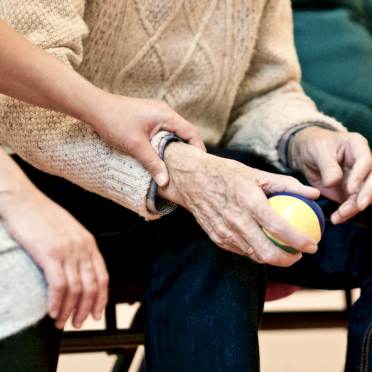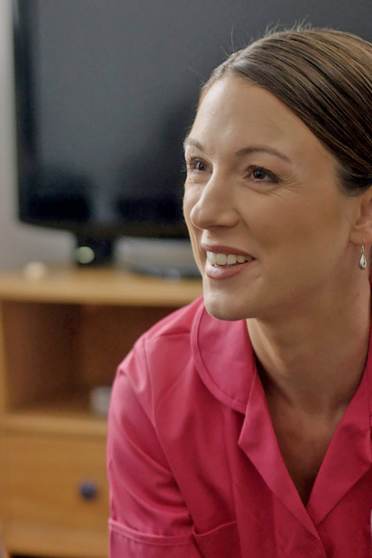What is a nursing home?
A nursing home is a facility providing everyday medical care for older people whose health issues make it too difficult to continue living in their own home, but who don’t need to be in hospital full-time.
A nursing home would typically offer a bedroom, sometimes with an ensuite bathroom and staff providing medical care services and support 24 hours a day and specialist care – such as occupational or physical therapy.
Some nursing homes feel more like hospitals, while others aim for a more homely and relaxed atmosphere.
Who should consider a nursing home?
Most people would only consider long-term care in a nursing home once living at home has become too difficult.
It’s always worth thinking first about altering your home to improve accessibility and safety, or using at-home carers and day-care. Moving home may be an option too – and of course, this is where Audley Villages come into their own.
But if you’re struggling to live alone, even with help from carers and relatives, or if you have complex medical needs requiring time in hospitals and round-the-clock attention, then residential nursing may be an option to consider.
Everyone’s needs are different when it comes to long-term care. Here are the main pros and cons of moving to a nursing home.
Advantages of nursing homes
Access to care: the majority of nursing homes are staffed full-time with skilled nurses and doctors, offering 24/7 medical support.
Lifestyle: most nursing homes run a busy schedule of social activities and recreation that help foster a sense of community.
Accommodation: this will include access ramps and hospital beds, plus medical supplies and equipment such as oxygen tanks. And there should always be a member of staff on duty to look after safety and security.
Disadvantages of nursing homes
Loss of independence: out of all the long-term care options, nursing homes offer the least independence. Of course, this may be a price worth paying for the level of support you receive.
Cost: medical facilities and trained personnel are expensive, and so most nursing homes charge residents and their families a sizeable fee.
Quality: negative press coverage has damaged public perceptions of this sector. Not all nursing homes achieve the same standards of care, so it’s important to choose one you (and your family) feel comfortable with.
Accommodation: for practical reasons, nursing homes often have an institutional atmosphere. Again, it’s important to weigh this against the advantages of this type of care – it may offer the best quality of life for your particular needs.
Are nursing homes and care homes the same thing?
All residential care homes offer accommodation and personal care (such as help with washing, dressing or taking medicines). Nursing homes offer a higher level of professional support and will usually have at least one trained nurse on duty around the clock.
If you have complex, ongoing health needs you may be able to get help from the NHS with the costs of a nursing home.
How can homecare services help?
Not everyone needs round-the-clock medical care, and homecare might be the difference that keeps you living independently for longer.
If you need personal or social care at home, your local authority can arrange a free assessment of your care needs. They will produce a written plan if you’re eligible for support, or advice on other options if you aren’t. You can also ask us about a free assessment with an Audley carer.
If you have long-term complex health requirements you may be entitled to NHS continuing healthcare, which also involves an assessment leading to a personalised care and support package.
Alternatively, you may be able to get free NHS care and support at home for up to six weeks after a stay in hospital, or to prevent you going into hospital. To apply for either of these NHS services, speak to your GP first.
Frequently asked questions
-
What is life like in UK nursing homes?
-
Even before Covid-19 brought extra restrictions on social contact, residents’ opinions about residential care were mixed. A 2017 report by Local Healthwatch found that provided quality varied not only between homes but also within the same home.
The watchdog said 80% of residential homes (of all types) provided good quality care, but the sector as a whole was “in a fragile state”. It recorded variation in standards over everything from décor to residents’ involvement in their home.
It’s therefore important to research the available services thoroughly – after all, a stylish interior doesn’t necessarily guarantee the best care. The Care Quality Commission should be your first port of call, while Which? offers a detailed checklist of advice on choosing a care home.
-
What do the nurses do in a care home?
-
Unlike a hospital, a nursing home offers a wide range of services to people who are well most of the time. Nurses are effectively working in their home and can develop closer relationships with their patients over time.
Their job covers administering medication, writing care plans, supervising other members of staff and liaising with local health teams.
They all have to be qualified Registered General Nurses and many take further training in specialties such as frailty, dementia and palliative care.





















